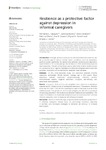Resilience as a protective factor against depression in informal caregivers

Use este enlace para citar
http://hdl.handle.net/2183/40726Colecciones
- Investigación (FEDU) [938]
Metadatos
Mostrar el registro completo del ítemTítulo
Resilience as a protective factor against depression in informal caregiversAutor(es)
Fecha
2024-07-10Cita bibliográfica
Vázquez FL, Blanco V, Andrade E, Otero P, Bueno AM, Simón MA and Torres ÁJ (2024) Resilience as a protective factor against depression in informal caregivers. Front. Psychol. 15:1370863. doi: 10.3389/fpsyg.2024.1370863
Resumen
[Abstract] Introduction: Although previous research has demonstrated that resilience can be protective against various mental health conditions such as depression, existing studies examining the relationship between resilience and depression have limitations. To our knowledge, the moderators of the relationship have not been examined. The aim of this study was to determine whether resilience acts as a protective factor against depression in informal caregivers and to examine potential moderators of the relationship between these variables. Methods: In this cross-sectional study, 554 randomly selected informal caregivers participated (86.8% women, average age = 55.3 years). Major depressive episode, depressive symptomatology, resilience, positive environmental reward, negative automatic thoughts, self-efficacy, and personality were assessed. Results: A total of 16.1% of informal caregivers met criteria for a depressive episode and 57.4% were at risk of developing depression. The average resilience score was 26.3 (SD = 7.6); 62.6% of participants were in the lower quartile of the resilience scale. The gender of the informal caregiver and self-efficacy acted as moderating variables in the relationship between resilience and depression. The impact of resilience on depressive symptoms was more pronounced in female informal caregivers, and increased as self-efficacy increased. Discussion: Based on these findings, programs aimed at preventing depression in informal caregivers should focus on promoting resilience, especially in women, and introduce strategies to enhance self-efficacy to increase their impact.
Palabras clave
Resilience
Depression
Predictor
Protective factor
Informal caregivers
Moderators
Depression
Predictor
Protective factor
Informal caregivers
Moderators
Versión del editor
Derechos
Atribución 3.0 España
ISSN
1664-1078






